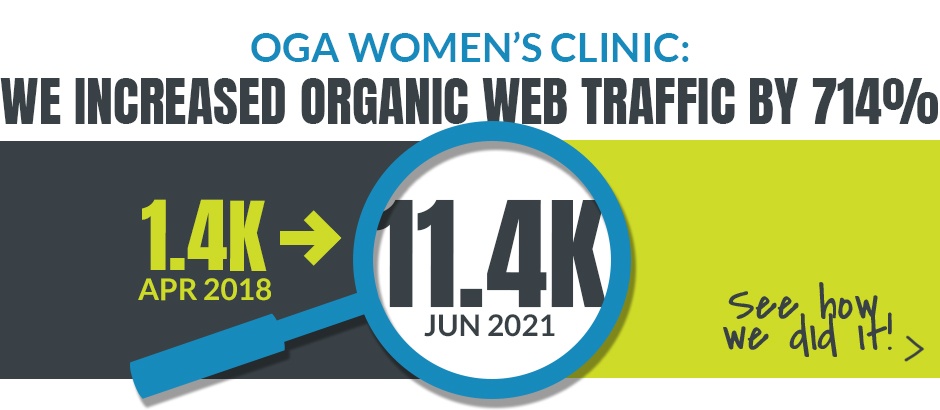How a Good Marketing Strategy Can Help You Attract New Patients
Posted by Caty Zimmerman on Sep 14, 2022 11:04:00 AM

As a healthcare organization leader, you know that attracting patients and growing your business is critical for success. With the impact of the pandemic and the rise of online searches for health information, patients are relying more and more on digital channels to find and connect with healthcare providers. Here's why digital marketing is essential for healthcare organizations and how to build a strong online presence.
The Benefits of Digital Marketing for Health Care Organizations
Digital marketing plays a vital role in the success of healthcare organizations. Healthcare organizations can reap several benefits by leveraging various inbound marketing strategies, including increased website traffic, higher search engine rankings, and improved patient satisfaction. With a strong online presence, healthcare organizations can establish themselves as trusted sources of information, build brand recognition, and attract new patients.
Moreover, a good marketing strategy can enhance patient communication and increase patient retention, leading to better patient outcomes and long-term success for the organization. By embracing these strategies, healthcare organizations can stay ahead of the competition and continue to grow their business.
Building a Strong Online Presence
Creating a professional website is the cornerstone of building a strong online presence for healthcare organizations. In today's digital age, patients expect to find healthcare providers online, and a user-friendly, mobile-responsive website optimized for search engines is essential. A well-designed website showcases the organization's services and resources and provides patients with a seamless digital experience that sets a positive tone for their overall patient experience.
A professional website can help healthcare organizations establish credibility and trust with potential patients. By providing relevant and valuable information about the organization's mission, values, and team members, a website can help patients understand the organization's values and the quality of care they can expect to receive. It can also feature patient testimonials, reviews, and success stories, which can inspire confidence and encourage patients to choose the organization over competitors.
To ensure that the website effectively attracts and engages patients, healthcare organizations should work with experienced web designers and digital marketers who understand the healthcare industry's unique needs. They can help the organization develop a website that is not only visually appealing but also optimized for search engines and user-friendly. They can also help the organization create a content strategy that provides patients with relevant and valuable information and helps build the organization's brand and reputation.
Leveraging Social Media
Social media is a powerful tool that healthcare organizations can use to build meaningful relationships with patients. By leveraging social media platforms such as Facebook, Twitter, Instagram, and LinkedIn, healthcare organizations can connect with patients, share relevant information, and create a sense of community.
The key to successful social media marketing for healthcare organizations is choosing the right platforms that align with their target audience. For example, Instagram might be ideal for reaching younger patients, while LinkedIn might be better suited for connecting with healthcare professionals. By creating engaging content that resonates with their audience, healthcare organizations can build a loyal following and improve patient satisfaction.
Responding to patient comments, reviews, and testimonials on social shows that the organization values patient feedback and is committed to providing excellent care. Social media also provides an opportunity to listen to patients' concerns and address any issues they may have, further enhancing patient satisfaction and loyalty.
By using social media to build relationships with patients, healthcare organizations can position themselves as trusted resources and thought leaders in their industry. This can ultimately lead to increased patient acquisition and retention and improved brand recognition and reputation.
Targeting the Right Audience
Identifying the target audience is crucial for getting the most out of digital marketing efforts and providing personalized patient care. By using market research, patient feedback, and patient personas, healthcare organizations can create targeted messaging and advertising campaigns that speak directly to the needs and preferences of their target audience. For example, if your healthcare organization specializes in pediatrics, your messaging should be tailored to parents and caregivers who are seeking high-quality care for their children.
Healthcare organizations can build lasting relationships with their patients by using targeted messaging and patient engagement strategies, improve patient satisfaction, and ultimately grow their businesses. However, it's essential to continuously monitor and adjust your targeting strategies based on patient feedback, changing market trends, and the evolving needs of your patients.
Emphasizing Patient Experience
Improving patient experience is a top priority for healthcare organizations that want to succeed in today's competitive landscape. Digital marketing strategies can help healthcare organizations enhance patient communication, engage patients with interactive tools, and create loyalty programs to improve patient retention. For instance, healthcare organizations can leverage email marketing campaigns to send personalized messages to patients reminding them of upcoming appointments, providing health tips and educational resources, and following up after appointments to ensure satisfaction.
Interactive tools such as chatbots can help patients find relevant information and get quick answers to their questions, improving their overall experience. For example, patients can use chatbots to schedule appointments, check their medical records, and get help with billing inquiries.
Overall, digital marketing is essential for improving patient experience and building long-term relationships with patients. By adopting digital marketing strategies prioritizing patient engagement and satisfaction, healthcare organizations can set themselves apart from the competition and establish themselves as trusted sources of information and care.
Measuring Success and Continuously Improving
Measuring success and continuously improving is essential for long-term success. Healthcare organizations must track website analytics, social media insights, email marketing metrics, patient feedback and reviews, and ROI to gain valuable insights into their marketing strategies. By leveraging these metrics, healthcare organizations can make data-driven decisions, adapt to changes, and continuously improve their digital marketing strategies.
For instance, website analytics can provide crucial information about website traffic, pageviews, bounce rates, and conversion rates. By analyzing this data, healthcare organizations can identify areas of improvement, such as optimizing landing pages or improving website speed, to enhance user experience and increase patient acquisition.
Similarly, social media insights can help healthcare organizations understand their audience's preferences, interests, and behaviors. By monitoring engagement rates, followers, and shares, healthcare organizations can create more engaging content that resonates with their audience and improves patient satisfaction.
Email marketing metrics can also provide valuable insights into patient engagement and satisfaction. By tracking open rates, click-through rates, and conversion rates, healthcare organizations can identify their most effective email campaigns and adjust their messaging to improve patient engagement and retention.
Patient feedback and reviews are also essential metrics for measuring the success of digital marketing strategies. By monitoring patient feedback on review sites and social media platforms, healthcare organizations can identify areas of improvement and address patient concerns promptly.
Finally, tracking ROI is crucial for measuring the success of digital marketing campaigns. By analyzing the cost of acquiring a patient and the revenue generated by each patient, healthcare organizations can determine the effectiveness of their marketing campaigns and adjust their budgets accordingly.
Get Your Healthcare Organization Started with a Digital Marketing Strategy Today
As a healthcare organization leader, embracing digital marketing is critical to stay ahead of the competition. By taking advantage of digital marketing, you can attract new patients, enhance patient satisfaction, and grow your business. Contact us today to learn more about how we can help you build a robust digital marketing strategy for your healthcare organization.Written by Caty Zimmerman
As the Director of Client Services and Account Manager, Caty's ongoing goal is to define client delight at Tribute Media and help our clients become heroes in the eyes of their customers.


